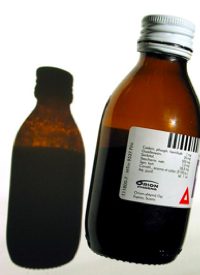
The Food and Drug Administration is pondering placing restrictions on the purchase of cough suppressants such as Robitussin and NyQuil because these, and a number of other similar over-the-counter medications that contain dextromethorphan, can be used to obtain a drug euphoria known as “robotripping.” Taking the drug as prescribed will not cause that effect, but 25 times the recommended dosage can induce robotripping.
This form of drug abuse, like nearly all its forms, can produce serious health problems. Improper use of these cough medicines is believed to have been responsible for over 8,000 emergency room patients in 2008 — overwhelmingly teenagers. That represents a 70 percent increase over 2004. The Drug Enforcement Agency has asked the Food and Drug Administration to take action.
While there is no present plan to ban these drugs, restricting their sale to behind the counter is being given serious consideration. State governments, of course, can act on their own to restrict the sale of medications with dextromethorphan in several different ways (requiring a prescription, banning sales to minors, or placing the medicines behind the counter). For the last several years, programs have educated parents about the dangers of abuse of certain types of over-the-counter drugs such as dextromethorphan.
The issue seems less about whether dextromethorphan poses a health risk — almost any drug taken in a dosage 25 times greater than recommended would pose a health risk — and more about what the federal government should do about it. Requiring a prescription would raise the cost of healthcare by involving a physician in a process that until now has been handled by individual consumer choice. Also, prescription drugs could be sold or given to teenagers. Banning the sale to minors would seem to open the door to adult “pushers” who did not have to deal with illegal drugs. Education about drug dangers is fine, but if that is not working, then the drug abuse problem is not being addressed.
We all know the best solution to this problem. It is the same best solution to alcoholism, abuse of prescription drugs, and the use of illegal drugs: strong families grounded in Judeo-Christian values along with wise and consistent parental involvement in the lives of their teenagers. Such involvement and values training removes the very reason teenagers seek some sort of “high,” as a substitute for a healthy and purposeful life.
Another vital part of the solution is the voluntary cooperation of private industry, either as individual firms or through industry associations. Companies such as Johnson & Johnson or Pfizer, both of which produce consumer cold medicines with dextromethorphan, have a very strong interest in being perceived as good members of the community and taking seriously the welfare of young adults.
Outright prohibition, as we learned when the federal government tried to ban alcohol, works poorly and often creates more problems than it solves. When the Soviets, for example, tried to combat alcoholism, Soviet men in the military would drink anti-freeze and aircraft fuel. The underlying problem was the endless tedium of the Workers’ Paradise and the limited number of ways to escape from the omnipresent Big Brother. The products which can make American teens "high" are all over the place: gasoline, nail cleaner, over-the-counter sleep medicine, paint stripper, and a large number of other substances.
We all have the power recklessly and masochistically to destroy our minds and bodies, and end our lives. The true way to stop the self-destruction of our young people is through voluntary, not coercive, methods. Parents who choose to have happy, close families keep their children away from drugs too. Parents who go to church or to synagogue with their children and take their religious beliefs seriously keep their children away from drugs. Parents who watch their children closely and take a regular interest in their lives keep their children away from drugs. These methods work. All too often, forms of government regulation and prohibition do not.



